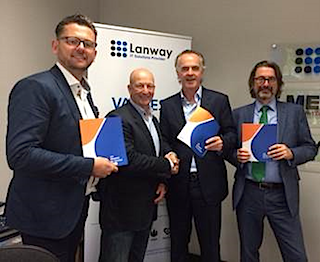The increasing popularity of managed service delivery models is fuelling European Communications Reseller sales of data and communications networks and everything from security to mobility and video conferencing solutions, with 67.5% of resellers now offering managed service solutions.
Yet the market remains highly regionalised and fragmented with 95.2% of communication resellers providing solutions only within their own or neighbouring countries. These are amongst the trends emerging from European Communication Resellers - the Top 750, a new database report from IT Europa which is published today.
The European Communication Resellers - the Top 750 report provides detailed profiles of the leading 750 European Communication Resellers across 36 countries.
Between them the companies post sales of €25.39 billion ($26.88 billion) and employ 122,742.
In terms of activities, 88% of companies are providing Data Communications/Networks solutions; 84% are providing Telephony/VoIP; 66% providing Security solutions; 61% are offering Mobility; and 57% are providing Video Communications/ Videoconferencing. Sales operations span a number of vertical market sectors the most common being the Public Sector (44.7%), Bank/Finance/Insurance (37.5%) and Manufacturing/Industry Vertical Market (33.3%).
The largest geographic markets covered in terms of companies profiled within the report are: UK (251 companies), Germany (51), Netherlands (51), Russian Federation (41), France (38), Spain (37), Italy (31), Switzerland (28), Turkey (24), Poland (23) and Sweden (23).
"It is good to see the European communication reseller community grasping the managed services opportunity, but there are several other challenges that will need to be addressed for the sector to achieve its full potential," says Alan Norman, Managing Director of IT Europa.
"A lack of standards in such growth areas as IoT (the Internet of Things) and national differences in terms of regulations will limit the potential for pan European growth. While recent agreements in areas such as roaming charges should help, these gains could be very swiftly undermined by potential political/economic events - for example Brexit."

 Chess has bagged Burnley-based ICT company Lanway for an undisclosed sum. It generated £21.8m turnover last year and has been in operation for 25 years, boasting over 550 active repeat customers including a number of blue chip names. The acquisition pushes Chess's headcount to 550.
Chess has bagged Burnley-based ICT company Lanway for an undisclosed sum. It generated £21.8m turnover last year and has been in operation for 25 years, boasting over 550 active repeat customers including a number of blue chip names. The acquisition pushes Chess's headcount to 550. Exponential-e has kicked off a five-a-side tournament for channel partners in a bid to raise funds for the Macmillan Cancer Trust. The first Channel Charity Cup was hosted at West Ham's Boleyn Ground and was one of the last games to be played at the stadium before the club relocates.
Exponential-e has kicked off a five-a-side tournament for channel partners in a bid to raise funds for the Macmillan Cancer Trust. The first Channel Charity Cup was hosted at West Ham's Boleyn Ground and was one of the last games to be played at the stadium before the club relocates. Rising star car racer Josh Webster, son of Nine Wholesale MD Nick, secured a first win for the Renault RSO1 in the GT Open Series and his second win at Spa on May 23rd.
Rising star car racer Josh Webster, son of Nine Wholesale MD Nick, secured a first win for the Renault RSO1 in the GT Open Series and his second win at Spa on May 23rd.